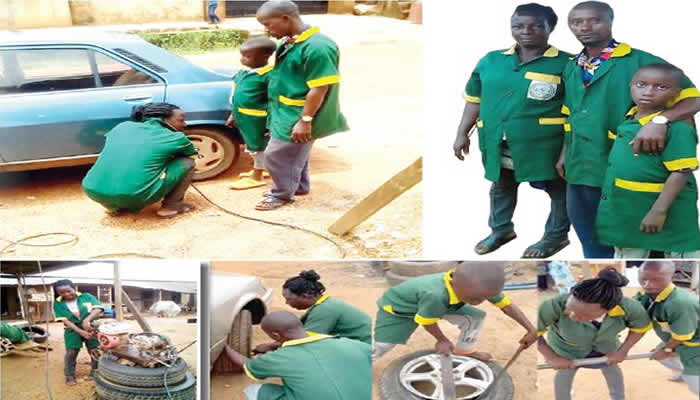
ABDULLATEEF FOWEWE writes about a family where the father, mother and their son are ‘vulcanisers’, an activity that is mostly undertaken by the male gender
Mrs Olubumi Omopariola’s hands moved swiftly and with precision as she deftly unscrewed the nut of the vehicle’s rear tyre that morning. It was at a popular spot on Samdot Street, New Garage Area of Ibadan, Oyo State.
Garbed in a green overall with yellow patches, which is the uniform worn by tyre technicians, popularly called vulcanisers, the 47-year-old mother, like a professional, squatted down to pull the deflated tyre from the wheel disc and rolled it to the machine, where she rinsed the thread with soapy water to locate the point of leakage. It was a familiar way to detect the leakage.
The owner of the vehicle as well as our correspondent, who both watched her keenly from under their makeshift shop, noticed her expertise and efficiency. All along, however, she was flanked by a man and a boy in the same uniform, both of whom lent a helping hand only when necessary.
As our correspondent would later find out, they were her husband and son, both of whom are also ‘vulcanisers’.
Olubunmi’s husband, Sunday, narrated to our correspondent how he started the business and why his wife and their son joined him.
Confident that his wife would do a thorough job, even without help, he took a walk with our correspondent.
Proud of having such support from his family, Sunday explained that he had been a professional tyre technician for 14 years after he left his fashion designing job in Ado-Ekiti for Ibadan. After trying his hands on two different jobs, he said he eventually settled for his current job.
He told Saturday PUNCH, “I was a fashion designer in Ado-Ekiti. When things were not going well, I decided to change environment. That was what brought me to Ibadan in 2005. When I got to Ibadan, the first job I did was driving. I drove one of the prominent men in Ibadan then, but the salary he paid me did not sustain me and my family till the end of the month, so I resigned and became a commercial motorcyclist, popularly called Okada.
“I did that for years and later realised I can’t ride okada forever. So, I thought of acquiring a skill, and the first thing that crossed my mind was ‘vulcaniser.’”
He said he learnt the business, with the support of his wife, who used her meagre N10,000 monthly salary as a teacher to take care of the family while his apprenticeship lasted.
“She was the one feeding the house with the small salary she earned as a private school teacher then,” Sunday said with a sense of appreciation to his wife.
When our correspondent asked Sunday if he had a hand in how his wife left her teaching job to join him at the workshop, he said both his wife and son joined him voluntarily.
“She’s a responsible woman and she doesn’t like to see me stress myself,” Sunday added.
Asked how it started, he said he was surprised the first day he saw his wife inflating a tyre. He said he never noticed his wife was developing interest and had started learning the job when she noticed he had no apprentice to help.
‘All for love’
On concluding the job, to the admiration of the customer, Olubunmi would later tell our correspondent that she believed the only way to help her beloved husband was to join him at the workshop despite being a Nigerian Certificate of Education popularly called NCE, holder.
She told our correspondent that she resigned as a private school teacher when she saw that her husband was left with no trainee as they all left after they completed their internship. Driven by love, she said she joined her husband at the workshop last year because she believed “it is not easy to be working alone, especially when you are not spending the money earned alone.”
Asides from the desire to help, she said the meagre pay from her teaching job was discouraging, adding that the business she ventured into to complement her income was not profitable.
She stated, “It is not easy to be working alone, especially when you won’t spend the money alone. I joined my husband when I saw he didn’t have an apprentice. He had certified all his trainees. The small business I was running at home anytime I returned from school was not booming as expected, and my salary was poor. That was when I decided to join my husband and son at the workshop.”
Highlighting the benefits of working with her husband of many years, Olubunmi said she joined him to motivate him, believing that they would earn more than what he used to earn when he worked alone.
She added, “I didn’t join him to be a monitoring spirit or because of fears that he might be cheating. I joined him to encourage him. I am lucky to marry a responsible man that is not lazy. It doesn’t mean I should take that for granted and be a lazy woman, I have to serve as motivation for him, and that was why I joined him, not to be a monitoring spirit.”
Olubumi, who said her late father was a pastor, noted that she didn’t have any knowledge of how to fix a tyre until she started sitting in her husband’s workshop and began to learn.
She said further, “My late father was a pastor, not a vulcaniser, and I never had a relationship with any vulcaniser. I didn’t have any experience about the job. I learnt it indirectly from my husband.”
Sunday told Saturday PUNCH that he never allowed his wife to take part in the stressful part of the work, adding that only he and his eight-year-old boy attend to articulated vehicles and lorries. However, when he is unavailable, his wife takes up the responsibility, if customers allow her, “and if customers don’t let her fix it, she would leave it till I return if they can wait.”
Asked how people often react when she attends to them, she said their customers used to appreciate her and treat her and her son specially.
She said, “Customers used to give me and my son extra money to appreciate our work.”
Asked how her friends, including her colleagues when she was a teacher, viewed her job, Olubunmi said she didn’t have friends and that she wasn’t the type to worry about what people say.
“As long as my husband is happy with me, I don’t care about what other people talk about, and there is no work I cannot do as much as it is legal. I believe if anyone abuses me today because of the type of job I’m doing, they will praise me tomorrow,” she added.
Sunday believes that once you have what people need, they will look for you, even if you are far away. He said God gave him the skills to satisfy customers and that some appreciate him by referring people to his workshop. “Many people know my shop on Samdot Street, New Garage, Ibadan, and I thank God for that,” he added.
Big dream, little beginning
Their eight-year-old son, Emmanuel, was not left out of the conversation.
The younger tyre technician, who started learning the trade when he was five years old, dreams to be a medical doctor someday, an aspiration he maintained would not be derailed by his current engagement at his father’s workshop.
Till date, Emmanuel, who would be in primary three when the next academic session resumes, joins his parents at the workshop every day when he returns from school.
Interestingly, he’s proud of his venture. “Most of my age mates do not make money on their own. At least, I am able to do something that can fetch me money at my age.”
Narrating how he developed interest in the job, he said he used to fight with his sisters whenever they were home together and that one way to maintain peace in the house was to make him stay with the father at his workshop.
His mother also reckoned that there was peace in the house when he started going to the workshop.
On how his friends relate with him, he said most of them were not aware, and that those who knew treated him with respect.
He stated, “Most of my friends don’t know I am a ‘vulcaniser’ because they don’t live close to my workshop. Those who know are my close friends, and most of them live around us.”
Olubunmi the multitasker
Given the nature of their job, which may not be every minute of the day, Olubumi said she decided to start selling yam, behind the workshop, to complement their income. However, she said she made sure that none disturbed the other.
“Any day I want to buy yam, I go to the market as early as 6am to make sure I get back to the workshop by 8am. I don’t let the two disturb each other. Sometimes if I see that the stress will be too much for me, I will order for yam from my customer to sell,” she added.
Interestingly, neighbours, friends and customers have a lot of commendations for the Omopariolas.
One of their neighbours, Olasukanmi, who is a tiler, said the trio had proven themselves to be trustworthy, hardworking and in love with what they do. “When I get married, I wish to have an understanding woman like Mr Sunday’s wife,” he added.
A barber, Mutiu Yusuff, whose shop is close to their workshop, also commended the family’s tradition of hard work. Likewise, Sunday’s friend, Lawal Kayode, said he cherished the family’s disposition to their work. “They are good. God gave them the knowledge to do this work, and I can recommend them to anybody in the world,” he added.
Customers’ remarks
Our correspondent spoke with some customers who came to fix their vehicles tyres.
A civil servant, Femi Olatanmi, who pulled over to gauge his tyre at their workplace, told our correspondent he admired their devotion to work. “I meet them at the workshop whenever I am going to the office. It shows they are a hardworking family,” he added.
Another customer, Ridwan Adisa, who came there to fix his motorcycle’s rear tyre, said the love that made the wife and son to join the man at his workshop was commendable. “I have recommended them to all my fellow bikers. They are good at what they do and they don’t extort people,” he added.
Olubunmi admitted that mutual understanding had been a blessing in their marriage, adding that women should never look down on their husbands’ jobs and that men should never take their wives’ understanding for granted. “Couples need to join hands together and understand themselves,” she concluded.





